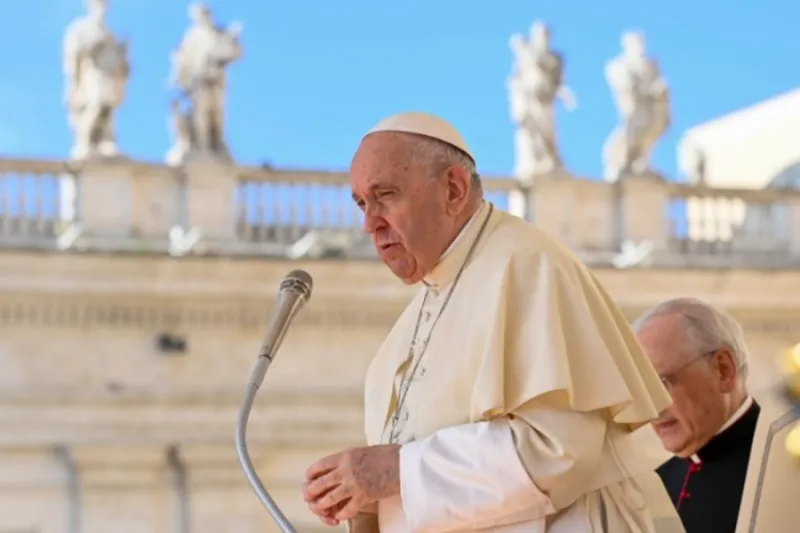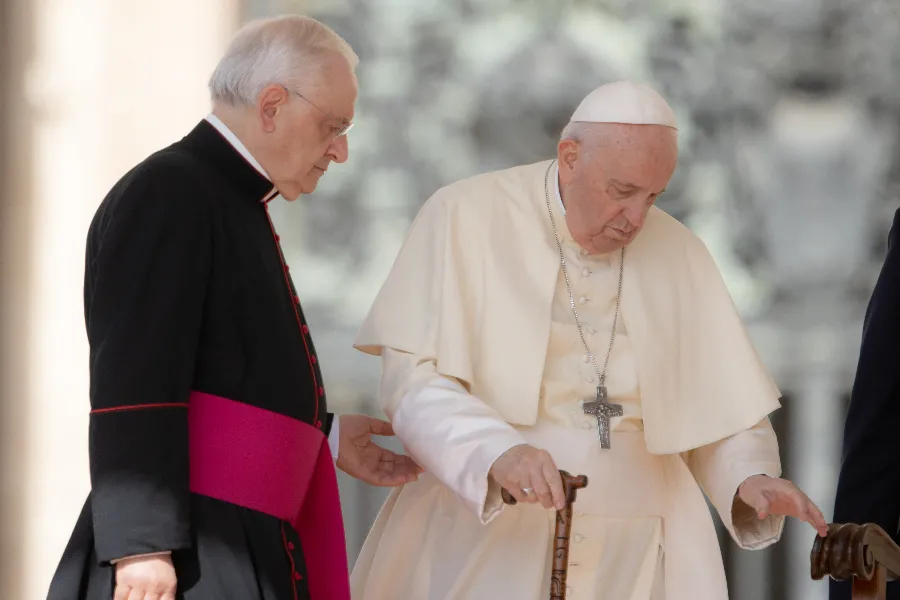 Pope Francis’ general audience in St. Peter’s Square, May 25, 2022. / Vatican Media.
Pope Francis’ general audience in St. Peter’s Square, May 25, 2022. / Vatican Media.
Vatican City, May 25, 2022 / 04:35 am (CNA).
Pope Francis said on Wednesday that Catholics today are living in an “age of fake news, collective superstitions, and pseudo-scientific truths.”
Reflecting on the Book of Ecclesiastes at his general audience on May 25, the pope suggested that the 21st century was marked not only by scientific knowledge but also what he called a “cultured witchcraft.”
“It is no coincidence that ours is the age of fake news, collective superstitions, and pseudo-scientific truths,” he said.
Speaking off the cuff, he went on: “It’s curious: in this culture of knowledge, of knowing everything, even of the precision of knowledge, a lot of witchcraft has spread, but cultured witchcraft.”
“It is witchcraft with a certain culture but that leads you to a life of superstition: on the one hand, to go forward with intelligence in knowing things down to the roots; on the other hand, the soul that needs something else and takes the path of superstitions, and ends up in witchcraft.”
The pope used the Italian word “stregoneria,” which can be translated as “witchcraft,” “sorcery,” or “black magic.”

The pope’s live-streamed catechesis was the 11th in a cycle on old age that he began in February. He entered St. Peter’s Square in a white jeep, stopping to invite children in brightly colored clothes to join him for part of his journey among the pilgrims.
The jeep drove up to a raised platform in front of St. Peter’s Basilica, where the 85-year-old was helped to exit the vehicle and walk up to the white chair where he gave his address. The pope, who has made public appearances in a wheelchair since May 5 due to knee pain, used a walking stick.
In his reflection, Pope Francis focused on the famous refrain in Ecclesiastes — also known as the Book of Qoheleth — that “everything is vanity.”
“It is surprising to find in Holy Scripture these expressions that question the meaning of existence,” he said. “In reality, Qoheleth’s continuous vacillation between sense and non-sense is the ironic representation of an awareness of life that is detached from the passion for justice, of which God’s judgment is the guarantor.”
“And the book’s conclusion points the way out of the trial: ‘Fear God, and keep his commandments; for this is the whole duty of man’ (12:13). This is the advice to resolve this problem.”
Pope Francis said that old age brought the challenge of “disenchantment,” which had to be resisted because of its “demoralizing effects.”
“If the elderly, who have seen it all by that time, keep intact their passion for justice, then there is hope for love, and also for faith,” he said.
“And for the contemporary world, the passage through this crisis, a healthy crisis, has become crucial. Why? Because a culture that presumes to measure everything and manipulate everything also ends up producing a collective demoralization of meaning, a demoralization of love, a demoralization of goodness.”
The pope said that collective demoralization sapped humanity’s will to act.
“In this form — cloaked in the trappings of science, but also very insensitive and very amoral — the modern quest for truth has been tempted to take leave of its passion for justice altogether. It no longer believes in its destiny, its promise, its redemption,” he commented.
“For our modern culture, which would like, in practice, to consign everything to the exact knowledge of things, the appearance of this new cynical reason — that combines knowledge and irresponsibility — is a harsh repercussion.”
“Indeed, the knowledge that exempts us from morality seems at first to be a source of freedom, of energy, but soon turns into a paralysis of the soul.”
Pope Francis said that the Book of Ecclesiastes captured this dynamic, in which “an omnipotence of knowledge” leads to “an impotence of the will.”
He noted that the early Church described this condition as “acedia,” which he said was not simply laziness or depression, but “the surrender to knowledge of the world devoid of any passion for justice and consequent action.”
He said: “The emptiness of meaning and lack of strength opened up by this knowledge, which rejects any ethical responsibility and any affection for the real good, is not harmless.”
“It not only takes away the strength for the desire for the good: by counterreaction, it opens the door to the aggressiveness of the forces of evil.”
“These are the forces of reason gone mad, made cynical by an excess of ideology.”
The pope noted that “weariness” was a hallmark of contemporary society.
“We were supposed to have produced widespread well-being and we tolerate a market that is scientifically selective with regard to health,” he said.
“We were supposed to have put an insuperable threshold for peace, and we see more and more ruthless wars against defenseless people.”
“Science advances, of course, and that is good. But the wisdom of life is something else entirely, and it seems to be stalled.”
Concluding his address, Pope Francis urged the elderly to help combat demoralization.
“They will be the ones to sow the hunger and thirst for justice in the young,” he said.
“Take courage, all of us older people! Take courage and go forward! We have a very great mission in the world.”
“But, please, we must not seek refuge in this somewhat non-concrete, unreal, rootless idealism — let us speak clearly — in the witchcraft of life.”
A summary of the pope’s catechesis was then read out in seven languages.
Addressing English-speaking Catholics, he said: “I greet the English-speaking pilgrims and visitors taking part in today’s Audience, especially those from Nigeria, Lebanon, and the United States of America.”
“In the joy of the Risen Christ, I invoke upon you and your families the loving mercy of God our Father. May the Lord bless you!”
In his closing remarks, Pope Francis lamented a school shooting in Texas.
A gunman opened fire at Robb Elementary School in Uvalde, southwest Texas, on May 24, killing at least 19 children and two adults.
The pope said: “My heart is broken for the massacre at the elementary school in Texas. I am praying for the children and the adults killed and their families.”
“It is time to say enough to the indiscriminate trafficking of weapons. Let us all work hard so that such tragedies can never happen again.”
His words were greeted with applause by pilgrims.